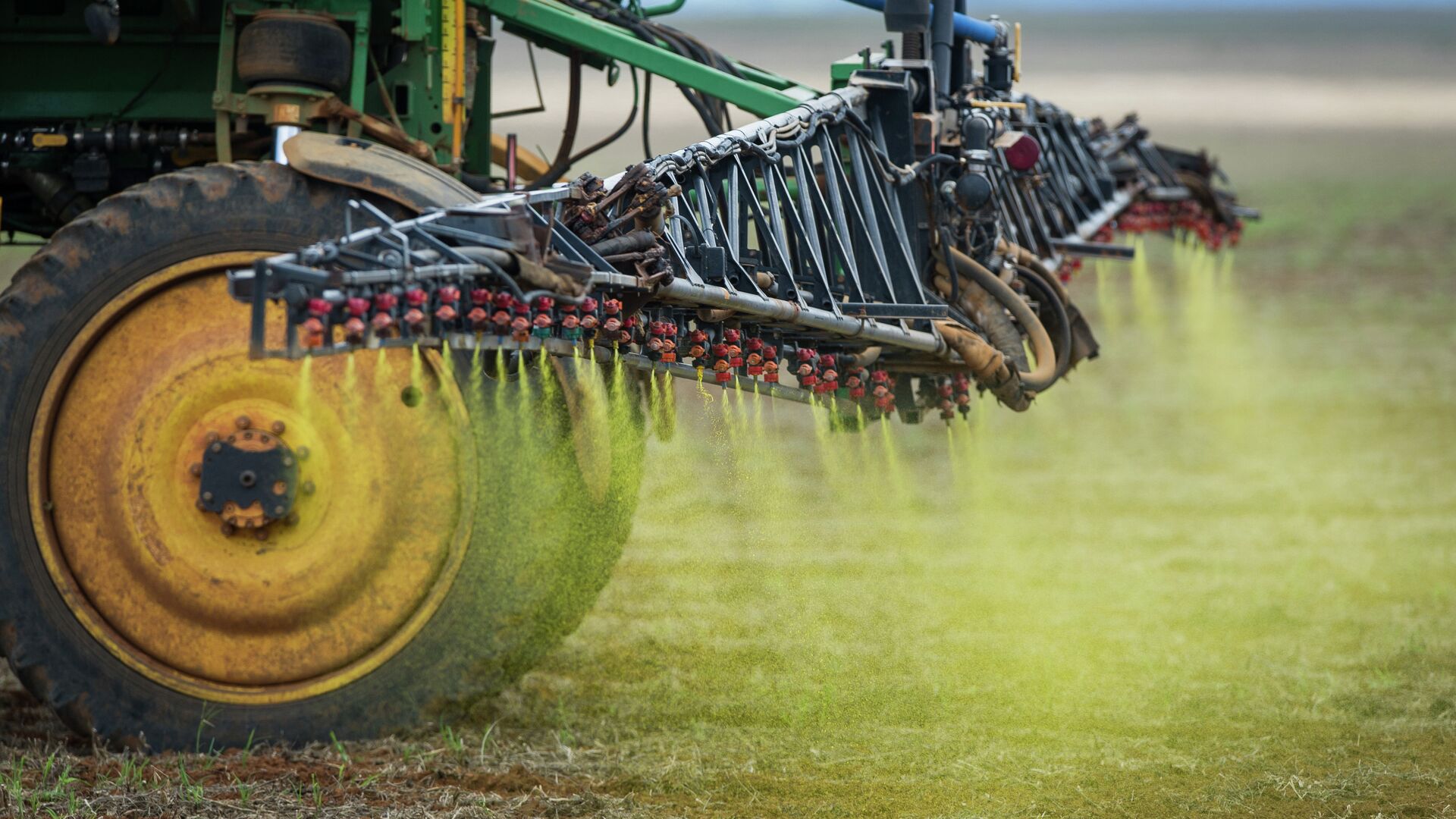https://sputnikglobe.com/20220528/us-govt-report-claims-china-could-create-gmo-bioweapons-deems-prc-interest-in-us-farmland-threat-1095850166.html
US Gov’t Report Claims China Could Create GMO Bioweapons, Deems PRC Interest in US Farmland ‘Threat’
US Gov’t Report Claims China Could Create GMO Bioweapons, Deems PRC Interest in US Farmland ‘Threat’
Sputnik International
The United States exported some $33 billion in agricultural goods to China in 2021, with top exports including soybeans, corn, pork, cotton, beef, poultry... 28.05.2022, Sputnik International
2022-05-28T16:18+0000
2022-05-28T16:18+0000
2022-05-28T17:30+0000
genetically modified food
national security
china
america
report
https://cdn1.img.sputnikglobe.com/img/102115/64/1021156479_0:207:4000:2457_1920x0_80_0_0_830a6a8be05ad78e3fa0bf56fa6c5df2.jpg
China’s interest in US agriculture poses a broad range of potential “security threats”, the US-China Economic and Security Review Commission has warned.In a report published Thursday, the commission complained about limited information on Chinese ownership and use of US farmland, citing a lack of federal requirements on foreign ownership reporting, and limited enforcement mechanisms for false reporting. The report suggested that “without the proper collection of land data, it will be increasingly difficult for the US government to monitor and consider any potential risks to national security”.The commission did not elaborate on these claims, citing only a 2018 Foreign Affairs article which pointed to the Japanese use of bioweapons against China in the 1930s and 1940s via the dropping of plague-infected fleas from aircraft and the spread of organisms carrying other diseases in water and rice fields. The Foreign Affairs report made no mention of any contemporary Chinese bioweapons programmes, but warned that “if the United States is not willing to lead” on biosecurity measures, “China has increased its investment in global health over the last decade and might step into the void”.The report also pointed to a “national security threat” from the Asian nation’s efforts to increase food security and agricultural self-sufficiency. “For example, Chinese companies’ acquisition of hog herds in the United States may save China money and enhance its domestic capability; however this could also reduce China’s need for US-sourced production and redistributes the environmental effects of hog waste to US communities”.US agricultural exports to China increased from $26.5 billion to $33 billion between 2020 and 2021. The US imported $3.8 billion worth of Chinese agricultural products in 2020, the last period for which data has been made available, with top categories including processed fruits and vegetables, dog and cat food, juices, and livestock products.
https://sputnikglobe.com/20220520/china-faulted-for-stepping-up-coal-consumption-but-us--europe-follow-suit-1095673867.html
https://sputnikglobe.com/20220520/us-senator-says-washington-will-have-to-loan-money-from-china-to-send-40bln-to-ukraine-1095657244.html
china
Sputnik International
feedback@sputniknews.com
+74956456601
MIA „Rossiya Segodnya“
2022
News
en_EN
Sputnik International
feedback@sputniknews.com
+74956456601
MIA „Rossiya Segodnya“
Sputnik International
feedback@sputniknews.com
+74956456601
MIA „Rossiya Segodnya“
genetically modified food, national security, china, america, report
genetically modified food, national security, china, america, report
US Gov’t Report Claims China Could Create GMO Bioweapons, Deems PRC Interest in US Farmland ‘Threat’
16:18 GMT 28.05.2022 (Updated: 17:30 GMT 28.05.2022) The United States exported some $33 billion in agricultural goods to China in 2021, with top exports including soybeans, corn, pork, cotton, beef, poultry, nuts, wheat, and dairy products. The US accounts for 18 percent of China’s overall food imports, second only to Brazil, which enjoys a 22 percent market share.
China’s interest in US agriculture poses a broad range of potential “security threats”, the US-China Economic and Security Review Commission has warned.
In a
report published Thursday, the commission complained about limited information on Chinese ownership and use of US farmland, citing a lack of federal requirements on foreign ownership reporting, and limited enforcement mechanisms for false reporting. The report suggested that “without the proper collection of land data, it will be increasingly difficult for the US government to monitor and consider any potential risks to national security”.
The report also claimed that there is a threat of Chinese weaponisation of GMOs (genetically modified organisms), suggesting US “economic and food security…could be at risk if GM seed code is used to create a bioweapon”.
The commission did not elaborate on these claims, citing only a 2018 Foreign Affairs
article which pointed to the Japanese use of bioweapons against China in the 1930s and 1940s via the dropping of plague-infected fleas from aircraft and the spread of organisms carrying other diseases in water and rice fields. The Foreign Affairs report made no mention of any contemporary Chinese bioweapons programmes, but warned that “if the United States is not willing to lead” on biosecurity measures, “China has increased its investment in global health over the last decade and might step into the void”.
The congressional report went on to accuse the Chinese Communist Party of threatening to gain “undue leverage over US supply chains if further consolidations and Chinese purchases of US agribusinesses take place”, and cited the need for “additional monitoring” of foreign-owned agricultural land near US military installations. The commission accused the People's Republic of stealing American intellectual property related to food production, saying such actions threaten to undermine the US’ competitive advantage in agriculture-related innovation.
The report also pointed to a “national security threat” from the Asian nation’s efforts to increase food security and agricultural self-sufficiency. “For example, Chinese companies’ acquisition of hog herds in the United States may save China money and enhance its domestic capability; however this could also reduce China’s need for US-sourced production and redistributes the environmental effects of hog waste to US communities”.
US agricultural exports to China increased from $26.5 billion to $33 billion between 2020 and 2021. The US imported $3.8 billion worth of Chinese agricultural products in 2020, the last period for which data has been made available, with top categories including processed fruits and vegetables, dog and cat food, juices, and livestock products.



